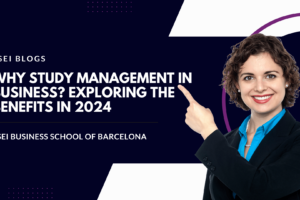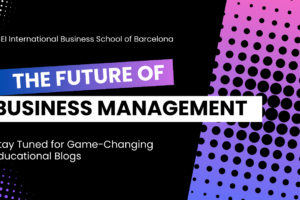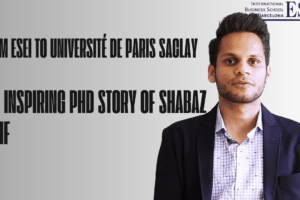
Master’s in Business Management: An essential programme at ESEI
There are lots of business management programmes out there – but they’re not all created equal. So, it’s important to do your research before signing up to a particular programme. After all, it’s a decision that could impact your entire career.
ESEI’s Master’s in Business Management is unique for a number of reasons. And, to illustrate what makes our programme different we spoke with our professor Tim Cakir – who teaches the Business Intelligence module – to share some insight about his classes. Let’s take a look:
1. Gain in-depth knowledge in diverse areas of business management
The ESEI Master’s in Business Management prepares students for any kind of management and leadership role in business. Students delve into a range of topics – including networking, digital transformation and diversity – which enables them to gain in-depth knowledge about the entire business management discipline.
Students complete the following modules over two semesters:
- Leadership and Organisational Behaviour
- Project Management and Lean Management
- Professional Communication and Development
- Strategy and Environment
- Production and Operations Management
- Cross-Cultural Management and Diversity
- Change and Innovation
- Financial Management
- Digital Business Strategy
- Business Intelligence
2. Learn in a practical, hands-on way
At ESEI we follow a Project-Based Learning approach; this prepares our students for the real world. During the one-year programme, students develop and present 10 separate projects that reflect real business scenarios. This not only helps students gain important business skills, but also provides them with a portfolio of work to showcase to future employers, collaborators or investors.
Rather than being able to say “I passed an exam”, students are able to talk about what they built, what solutions they developed, and how they worked as a team to produce a positive outcome.
Let’s take a look at an example from Tim’s Business Intelligence class. Students were tasked with tackling a business intelligence problem of their choice. They had to gather a publicly available dataset, clean and analyse the data, and then visualise it in a compelling presentation. Students had to act as if they were part of a business intelligence team presenting a proposal to their company’s board of directors.
“Once students complete the course, they become data-literate: they are able to speak the language of data. They can apply business intelligence software to specific use cases. They know how to find data, how to analyse it and create dashboards, and how to ask data scientists the right questions,” said Tim.
“And above all, they know how to get their point across with the help of data – which is a very useful real-life business skill.”
3. Practice your creativity and problem-solving skills
All our programmes are designed to equip students with essential skills to succeed in the 21st-century workplace. And problem-solving and creativity are some of the most sought-after skills today.
Thanks to our Project-Based Learning approach, every module gives students a chance to participate in a group project. We often leave project briefs open for students to interpret on their own. This means students get to be creative, and work together effectively to create a positive outcome.
“Because the projects are loosely defined and open to interpretation, students get more excited about them. They have fun developing their own projects and watching other groups present theirs,” Tim said.
For example, said Tim, one group focused on reducing air pollution. Another chose to examine how we could cut down on food waste.
And, all the groups came up with creative solutions. Some took a more technical approach and built elaborate dashboards in Tableau. Others chose more simple ways to present their data, using Google Data Studio. Each group was able to tap into their members’ individual strengths to come up with solutions that could, in the real world, inform great business decisions.
4. Learn from the best in the business
Our students get to learn from international experts and thought-leaders. All of our professors are working professionals who are familiar with the latest trends and most innovative tactics of their respective fields.
Many are also important pillars in the local and international business scenes. This means that through building connections with ESEI professors, students can begin to network outside the classroom.
Some of our instructors include:
- Victoria Masters – a business education and training specialist with over 10 years of commercial experience account managing some of the UK’s most-loved brands.
- Steve Mallon – a consultant and coach with extensive experience in project and event management, as well as change and crisis management. You can read our interview with Steve about his guest speaker sessions here.
- Jan Jonckheere – a consultant with 31 years of experience working in international business. He advises SMBs on export and international expansion strategies. You can our interview with Jan about international business in a changing world here.
- Roy Mouawad – a consultant, lecturer and researcher with expertise in leadership and talent management.
- Elena Emma – a serial entrepreneur and multifaceted business expert who runs an online startup incubator. You can read our interview with Elena Emma about how startups can find opportunities in a crisis here.
- Denis Boevskiy – a Finance Director at LCF Group with extensive international experience working with companies with a revenue of €300M-€5B.
- Tim Cakir – a growth consultant, digital marketing expert and Chief Growth Officer at Planet of the Vapes. He has a background in tech and has helped several international businesses grow.
Our profesors also lead exciting debates and group discussions in the classroom about leading-edge industry topics. For example, Tim and his students talked about data transparency and the possibilities of predictive analytics.
“The problem with data is that we don’t share it. The crisis has proven that. If we were all in one infrastructure and countries were sharing data, maybe we wouldn’t have had this pandemic,” said Tim. “The solution? Maybe to put everything on the blockchain. These are topics that we often discuss with my students.”
5. Improve your soft skills
Last but not least, ESEI’s Master’s in Business Management offers a great chance for students to improve their soft skills. Students are required to present various projects, which is excellent
public speaking practice – especially considering there’s a presentation required in each module.
And in the Professional Communication and Development module, students participate in regular networking events – as well as learn how to effectively build their personal brands online.
If this sounds like a programme for you, head over to our Master’s in Business Management page and enroll now!



